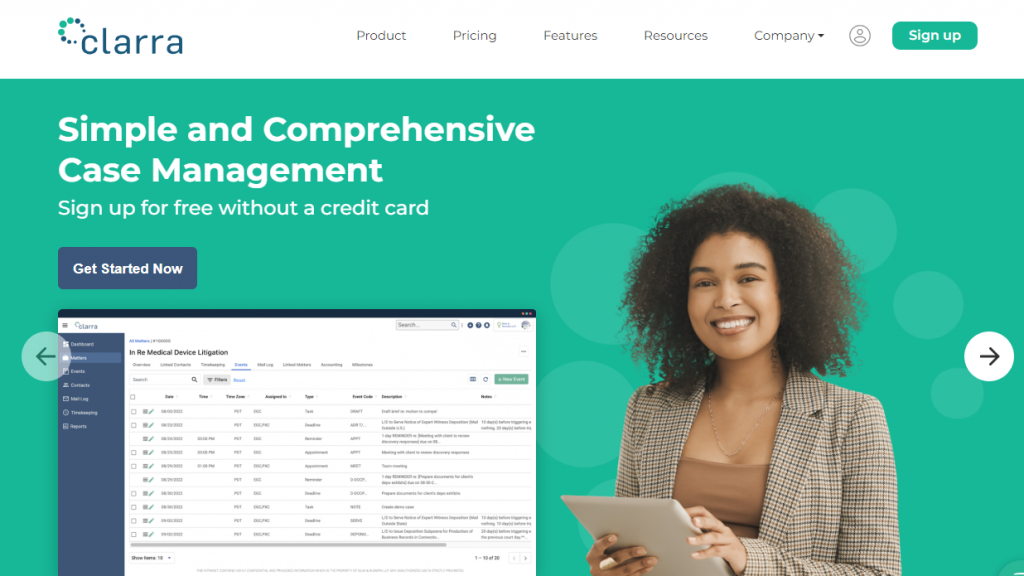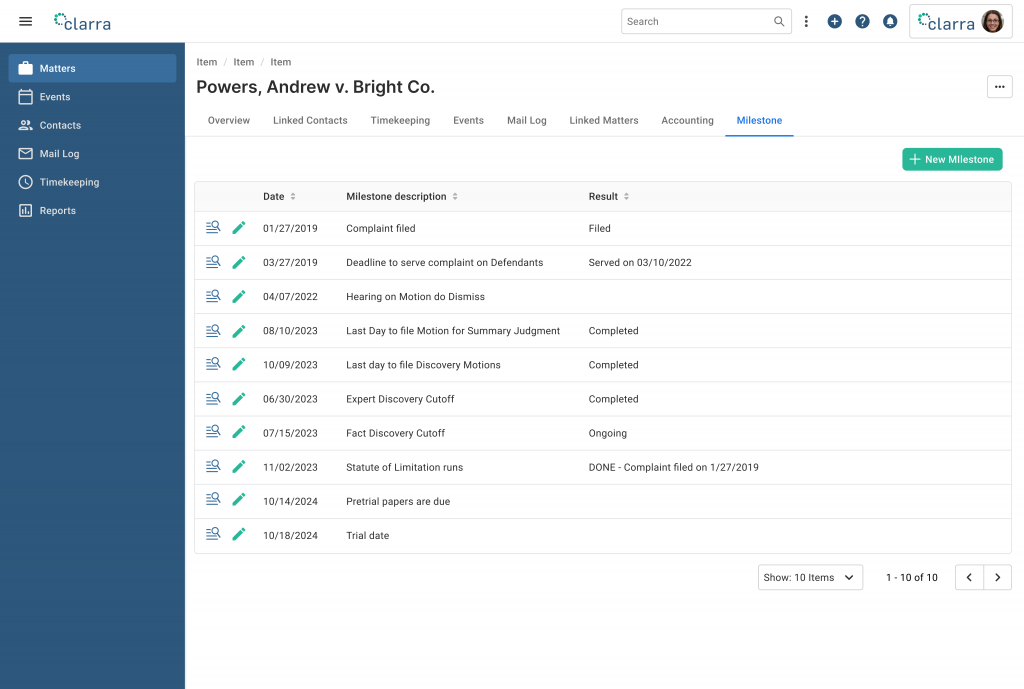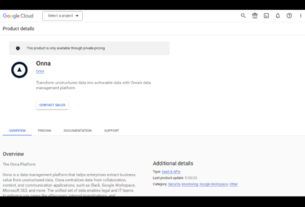When San Francisco lawyer Todd Schneider’s litigation firm, Schneider Wallace, became frustrated with its options for case management software — finding existing products to be antiquated, inflexible, and better suited to transactional practices — the firm decided to build its own. From those roots was developed Clarra, a cloud-based case management platform that spun off from the firm and is formally launching today.
Designed to be optimized for docket-driven litigation practices, Clarra is a full-featured case management platform that simplifies the management of matters, events, tasks, deadlines, documents, timekeeping, and reports.
“We leveraged our experience and systems to help Clarra develop a case management solution that improves efficiency and drives faster and better outcomes for clients,” said Schneider, the company’s cofounder. “Since moving our entire firm to Clarra, we’ve been able to grow more rapidly and take on more cases without adding additional staff.”
Read more about Clarra in the LawNext Legal Technology Directory.
Using Clarra, Schneider Wallace has improved its attorney-to-staff ratio to 3:1, the exact opposite of staffing levels at most firms, the company says. Clarra has also provided a stable platform to support the firm as it added matters, lawyers, and practice areas.
Keao Caindec, Clarra’s CEO and cofounder, said that when they initially considered developing the Schneider Wallace software for the broader litigation market, he surveyed the options for case management products and practice management software, and he found that most were built for transactional practices — for routine invoicing, time tracking and calendaring, but not for docket-driven practices.
Of the few he found that were oriented towards litigation practices, they were complicated to use and took a long time for a firm to customize and integrate.
“We’ve tailored Clarra to the lifecycle of managing a case from filing a complaint to resolution to ensure our clients never miss a deadline,” he said. “Having seen the benefits of Clarra at Schneider Wallace and other early clients, it is exciting to bring our product to a broader market that so desperately needs it.”
Designed for Litigation
Last week, ahead of today’s launch, Schneider and Caindec gave me a demonstration of Clarra.
The product is designed to work well for any type of civil litigation firm, from personal injury to mass torts and class actions, and to be simple to use right out of the box, Caindec said. The target market for the product is small and mid-sized firms, but it could be used by firms of virtually any size.
For lawyers, paralegals and others using the platform, its dashboard provides a home base for monitoring case activity. From the dashboard, a user can keep track of deadlines and appointments, see matters recently opened or closed, track time, and see other key information about cases. From there, a user can click tabs for matters, events, contacts, timekeeping, reports, and a mail log that tracks final versions of documents.
“One thing that we do that’s unique is we have taken deadlines, appointments, tasks and reminders and put them all into a consolidated view,” Caindec said. “So rather than trying to track your activities and tasks or track your calendar, we have it in a single view to make it very easy to manage everything associated with a matter.”
To ensure that final versions of documents are properly tracked, docketed and calendared, Clarra includes a feature called Mail Log. It includes all final versions of documents received or sent by the firm. When adding a document, Mail Log includes a “Send to Docketing” check box to send the document to the firm’s docketing staff. Once the staff has docketed and calendared the document, they can mark the document as having its docketing complete.
“This makes it easy for these firms to run reports where you can get a docketing audit trail and understand exactly what has been sent to docketing, what’s been completed, what has not been completed, so they can make sure that every single thing gets docketed,” Caindec said.
For court calendaring, Clarra integrates with CalendarRules, which allows the user to set a trigger event and calculate all subsequent dates and deadlines. Note that a separate CalendarRules subscription is required to take advantage of this integration.
Milestones and Multiple Reminders
While most case management platforms allow users to set reminders for key events on their calendars, Clarra takes it a step further, allowing users to set multiple reminders for a single event (such as 90 days out, 60 days out, 30 days out, etc.).
Another shortfall Caindec saw in other platforms was that they did not do a great job of tracking items such as the estimated fees and costs that the firm could expect to recover, what the firm actually recovered, and what are the recovery phases. Relatedly, other platforms made it difficult to track major milestones in a case, as opposed to all case events.
“When a partner comes and says, ‘Give me a summary of where we stand on this case,’ there are really only about a dozen to 40 key milestones that matter, depending upon the type of case,” Caindec said.
Clarra’s solution for this is to allow the user, when setting up an event of any kind, to designate it as a milestone, making it easier to track exactly where you are with different milestones in a case.
“So you can come in, find out exactly what you want, customize all of the fields, understand how much time you’ve spent on the case, track all of the events and final documents, have reports on to make sure that you haven’t missed a deadline and everything has been docketed, and keep track of key milestones. Simple, intuitive.”
What It Costs
Clarra offers a free version of its software that is unlimited in duration and that allows an unlimited number of users. However, it is limited to five open matters and 10GB of storage.
The paid version is $55 a month per user, with no annual commitment, or $564 if purchased annually. That includes unlimited storage and access to all features.
“It’s about 25% to 50% less than the per-user cost of other platforms,” Caindec said. “And it’s very straightforward to use.”
One early customer of Clarra, Edward Susolik, CEO and president of Callahan & Blaine, said it helped his firm improve the management of its contingency cases. “Their team made the transition easy by working diligently on planning, onboarding, and training. They were also able to quickly integrate with our systems to improve visibility and reporting.”
A firm can try out the free version today without even having to put down a credit card. If your firm is shopping for a new case management solution, the free offer is a no-risk way to test out Clarra.





